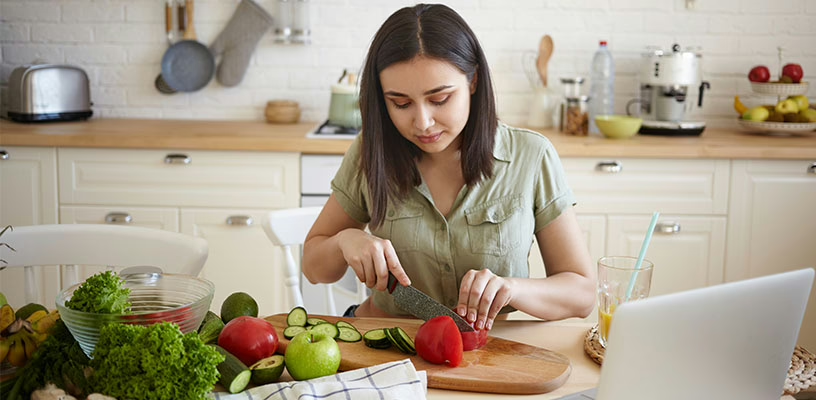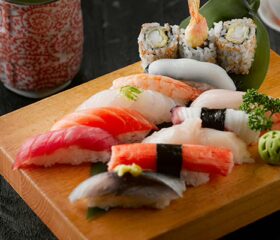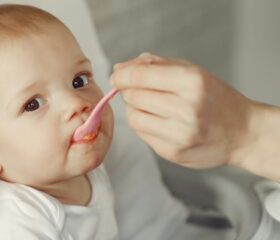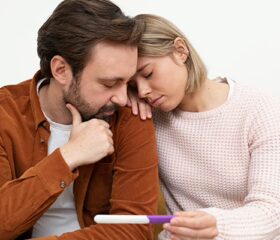Planning Your Fertility Diet: What to Eat and Avoid to Get Pregnant Faster
If you’re trying to get pregnant, what you put on your dinner plate could speed up the process.

While your fertility depends on your age, lifestyle, and genetics, your diet may also play a surprising role. There’s no magic food that guarantees pregnancy, but a balanced diet rich in essential nutrients just might improve your chances.
Here’s a breakdown of which nutrients and foods to include in your pre-pregnancy diet and which ones to steer clear of, for both women and men.
How your diet affects your fertility
A well-rounded diet boosts your and your partner’s (or sperm donor’s) reproductive health. It benefits:
- The regularity of ovulation (when your ovary releases an egg for fertilization)
- The actual fertilization process
- The quality of sperm
Eating well also plays a role in how well you can maintain a healthy weight, which is one of many factors affecting your fertility. Being underweight or overweight can affect your menstrual cycle and make it harder to get pregnant. 1 Having a body mass index (BMI) over 25 can negatively impact the quality of both sperm and eggs. 2 A BMI under 19–20 can also affect fertility.
Aim for a healthy BMI through a balanced diet and regular exercise (ask your doctor to recommend safe exercises to include in your pre-pregnancy workout plan).
What nutrients do you need for fertility?
You should start taking prenatal vitamins with at least 400–600 micrograms (mcg) of folic acid one to three months before trying to get pregnant. 3
These supplements help ensure you get enough essential nutrients to prep your body for the difficult task of creating life and reduce your baby’s risk of birth defects.
Here are the most important nutrients that will support your fertility and pregnancy: 4 5 6 7
- Folic acid (folate or B-9): This B vitamin prevents your baby from developing neural tube defects like spina bifida. Aim for a minimum of 400 mcg daily, ideally through a combination of food and a prenatal vitamin recommended by your doctor during your preconception appointment.
- B-12 (cobalamin): A deficiency of this vitamin can sometimes cause temporary infertility. 8 Try to get 2.4 mcg of it per day. 9
- Calcium: Calcium supports your reproductive system, as well as the production of sperm and their ability to swim. Strive for around 1,000 mg daily.
- Omega-3 fatty acids: These “healthy” fats may help regulate the hormones that affect your ovulation (when you release an egg for fertilization). They also influence the quality of your partner’s sperm.
- Zinc: You need about 8 mg of zinc a day (11 mg a day for men). It plays an important role in egg and semen production.
- Iodine: You need this nutrient for ovulation, metabolism, weight management, and fetal brain development. Try to get 150 mcg a day.
- Antioxidants: Vitamins A, C, and E support egg development, the growth of your uterus’s lining, and the quality of your partner’s sperm.
Talk to your doctor before significantly changing your diet or starting any new supplements. They’ll assess your needs and provide personalized recommendations based on your health history and lifestyle.
Your partner needs to eat healthily, too
As mentioned, certain vitamins and nutrients are essential for healthy sperm production, such as zinc, omega-3 fatty acids, and folic acid. Your partner should also include selenium in his diet, as a deficiency can lead to infertility in men. He should get 55 mcg per day, although he’s more than likely already meeting his daily requirement if he eats seafood or meat.
What foods to include in your fertility diet
If you’re trying to conceive, focus on eating nutrient-dense meals and avoiding processed foods and unhealthy fats (which is actually similar advice to follow for your pregnancy diet). 10
Here are the best foods to add to your diet so you can improve your and your partner’s fertility, boost your overall health, and (hopefully) get pregnant faster: 6 5 11 12 13
| Food | Examples | How much you need | What they contain |
|---|---|---|---|
| Fruits and vegetables | - Leafy greens (e.g., spinach, kale) - Citrus fruits - Berries |
5 servings daily | - Folate (leafy greens) - Vitamin C (citrus fruits) - Calcium (citrus fruits) - Potassium (citrus fruits) - Antioxidants (berries) - Iron (leafy greens) |
| Whole grains | - Quinoa - Brown rice - Whole wheat bread |
1.2 servings daily (equivalent to 6 ounces) | - Folate - Protein - Fiber - Zinc |
| Dairy products | - Yogurt - Greek yogurt - Whole milk - Cheese |
3 cups daily | - Calcium - Probiotics - Iodine - Vitamin B12 - Protein |
| Lean proteins | - Poultry - Beans - Lentils - Eggs |
2–3 servings daily | - Protein - Vitamin B12 (meat) - Iodine (eggs) - Zinc (eggs) - Vitamin A (eggs) - Iron |
| Seafood | - Sardines - Herring - Trout - Mackerel - Anchovies - Oysters - Salmon |
No more than 12 ounces per week (to limit mercury exposure) | - Protein - Omega-3 fatty acids |
| Nuts and seeds | - Almonds - Cashews - Chia seeds - Flaxseeds - Walnuts - Brazil nuts |
1 serving daily | - Protein (nuts) - Monounsaturated fat (almonds, cashews) - Omega-3 fatty acids (chia seeds, flaxseeds, walnuts) - Fiber (chia seeds, flaxseeds, walnuts) - Magnesium (chia seeds, flaxseeds, walnuts) - Selenium (Brazil nuts) |
| Healthy fats | - Avocados - Olive oil - Canola oil |
1 serving per day | - Folate (avocado) - Monounsaturated fat - B vitamins (avocado) - Vitamin E (avocado) |
What foods to limit or avoid in your fertility diet
Certain foods can negatively impact both your and your partner’s fertility and overall health. Here are foods you should try to phase out of your diet while you’re trying to conceive: 14 12 13 11 4
- Trans fats: Found in many processed, fried, sugary baked goods, and fast foods, these fats are linked to infertility in both women and men.
- High GI (glycemic index) carbohydrates: Avoid sweetened drinks, cakes, cookies, desserts, refined white bread, rice, and cereals. These foods can cause a rapid spike in your blood sugar levels. If you have polycystic ovary syndrome (PCOS), pay extra attention to your carb intake, as refined carbohydrates can also worsen hormonal imbalances.
- Alcohol: Binge drinking can affect how long it takes you to get pregnant. It’s best to limit yourself to a couple of glasses of alcohol a week while you’re trying for a baby, and abstain entirely if you suspect you’re pregnant.
- Tobacco and recreational drugs: Recreational drug use and smoking while trying to conceive can make it harder for you to get pregnant and cause issues with men’s sperm.
- Caffeine: Very high caffeine consumption (more than 500 mg a day) could interfere with your fertility and increase your risk of miscarriage. Limit yourself to less than 200 mg a day (about two cups of coffee). 15 Remember that there’s also caffeine in chocolate, soft drinks, energy drinks, and tea—not just coffee.
- Seafood high in mercury: You’ve probably heard about high-mercury seafood being at the top of the list of foods to avoid during pregnancy. The same goes before you actually get pregnant. Avoid large ocean fish, like shark, swordfish, some types of tuna, and tilefish, as they often have higher concentrations of mercury. 16
- Processed soy products: Some people advise staying away from soy protein isolate (usually found in protein powders and energy bars), which they claim can affect your hormone balance. You can still eat whole, unprocessed soy foods, like edamame and tempeh, as well as fermented soy, such as miso and natto.
Talk to your doctor if you have difficulty adjusting to a new diet or quitting alcohol, tobacco, or recreational drug use. They’ll be able to give you guidance on how to adopt healthier habits and prepare for pregnancy in general.
Final thoughts
While your diet is just one piece of the fertility puzzle, it’s a powerful tool you can use to optimize your chances of conception.
Focus on eating a balanced diet rich in essential nutrients, limiting unhealthy foods, and adopting a healthy lifestyle. Remember that consistency and patience are key. Stay committed to your healthy eating plan and keep your doctor in the loop.
Article Sources
- Office on Women's Health. "Weight, fertility, and pregnancy" Retrieved August 5, 2025.
- UCSF Center for Reproductive Health. "Lifestyle & Fertility Recommendations" Retrieved August 5, 2025.
- Cleveland Clinic. "Prenatal Vitamins" Retrieved August 5, 2025.
- The Well by Northwell. "Foods And Drinks That Can Help Your Fertility" Retrieved August 5, 2025.
- University of Rochester Medical Center. "Nutrition Before Pregnancy" Retrieved August 5, 2025.
- Utah State University. "Nurturing Fertility: How Nutrition Can Set the Stage for Conception" Retrieved August 5, 2025.
- Verywell Health. "Supplements for Fertility: What to Take When Trying to Get Pregnant" Retrieved August 5, 2025.
- National Health Service. "Complications - Vitamin B12 or folate deficiency anaemia" Retrieved August 5, 2025.
- Cleveland Clinic. "Vitamin B12 Deficiency" Retrieved August 5, 2025.
- Verywell Fit. "What Is the Fertility Diet?" Retrieved August 5, 2025.
- MedlinePlus. "Steps to take before you get pregnant" Retrieved August 5, 2025.
- Epworth HealthCare. "Nutrition for fertility" Retrieved August 5, 2025.
- UPMC HealthBeat. "Fueling Fertility: How Nutrition Can Improve Your Chances" Retrieved August 5, 2025.
- Office on Women's Health. "Preconception health" Retrieved August 5, 2025.
- Tommy’s. "Caffeine and getting pregnant" Retrieved August 5, 2025.
- U.S. Food & Drug Administration. "Advice about Eating Fish" Retrieved August 5, 2025.







